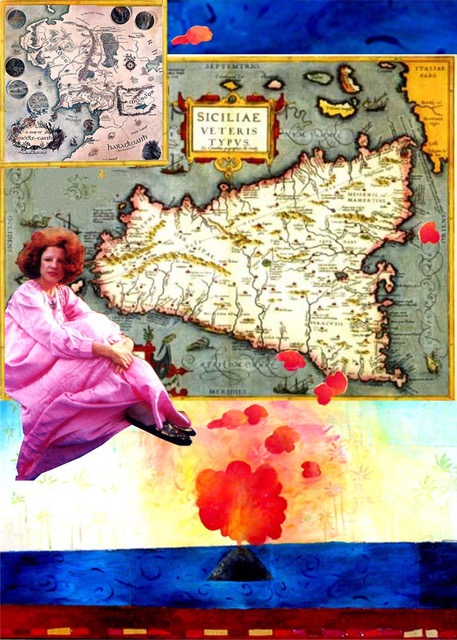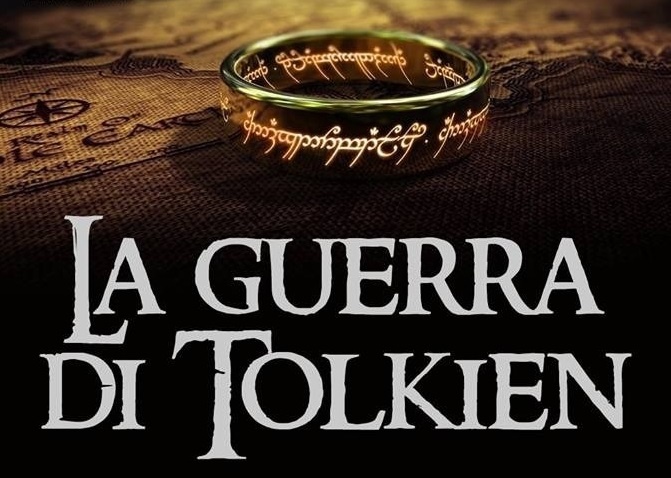Professionalism
Wu Ming 4 pushes us to talk about professionalism. As I have previously reminded, in his review of Oronzo Cilli’s Tolkien e l’Italia he wrote about The Lord of the Rings translation:
“When reading this part of the book one is even more convinced that the matter, after half a century, needs to be taken in hands again from the beginning, with a different approach, high professionalism a better knowledge of the text and of Tolkien’s poetic.”
This sentence is at the least unfair to someone like princess Alliata. In order to help everyone to understand why, we’re getting to know her better and try to go beyond the label stuck on her as the first improvised translator of The Lord of the Rings.

Princess Alliata has travelled much in her life. After translating The Lord of the Rings, like a real character of a life beautiful like a fairy-story, she has travelled and has met great personalities (a short summing up can be found in an interview she gave to Repubblica, signed by Antonio Gnoli on the 14th may 2017), but at a certain time she has felt the need to come back to her own land, Sicily, and to fight for it, showing a rare talent to love. When she presented her father’s autobiographical book (Francesco Alliata, ‘Il Mediterraneo era il mio regno. Memorie di un aristocratico siciliano’, Neri pozza editore, 2015) the princess told us about the heritage she decided to take from him.: this looks like a fairy-story, as well11.
I quote:
“I take the liberty to ask you a private question; it is obviously up to you to answer or not. Today, which prospect does all this spiritual and material inheritance give you for tomorrow? (She was able to reunite a part of the proprieties of Villa Valguarnera)12… Because Sicily was loved so much, but it has not always reciprocated her love…
V.A.:… Well… let’s say that, obviously, my father and I have shared all these last thirty years of battles and, for sure, I have given up my own life because one day I heard him say: “I cannot be the gravedigger of this land and of this family”. Although I had my life, my job, my world (I am a writer, I lived abroad, I used to teach, write, travel, take photographs), I have felt the need to do my part, too, for a main reason: not only to save the family properties that were taken away as a punishment, because we were different—we were Ghibellines—but also because I thought this land needed positive examples. At that time some magistrates were killed13 , together with the ideals they were pursuing. A whole ancient, historical and intellectual world had supported these ideals (I am talking about Leonardo Sciascia14, and other personalities that have passed away so far15). On my shoulders I felt all the responsibility to give an example, even if humble; I am not in politics, but by coming back and leaving my own life, my straightforward life, my job and all the rest, and putting it at this land’s service like my father did, I thought to “pay the bill”… A bill that I thought it was right to pay while I was “alive”, in the sense that, I was always received everywhere abroad with open arms because I was an Italian princess – therefore, without doubt a respectable person, an honest person because I belonged to an ancient history, I belonged to this land and thanks to it I was accepted elsewhere andI was able to understand other worlds. I had to “pay the bill” to this Sicily so cosmopolitan , so… so “global” way back, a thousand years ago, that is, somehow I had to give something back to this Sicily, even though I was sure that our efforts, just like my father’s, wouldn’t end well. I must say that, after all, I could do something…!”
The cultural projects (but not only: it is enough it to remind the war against the mafia and the clan of Provenzano in the period she was asked to translate the History of Middle-earth) she pursued had something to do with Tolkien as well. In cooperation with the cultural association ‘Alessandro Tasca Filangeri di Cutò’, in May 2010 she participated to “Sicilia Terra di Mezzo – Risveglio del pensiero mediterraneo”16: the general idea is to give a shock to her beloved and full-of-culture land, but also much neglected and invaded by the mafia. In an unpublished article — I must thank her for sending it to me— the princess writes :
“So far in Italy the left and right categories have neutralised restless people and polarized the great problems of the last 40 years. To the unsatisfied people of our times, to the one who felt an urge to understand, or to find again values on which our lives are based, they’re answered by means of ‘blocks’, as if saving the planet, quality of life (monnezza17, and legality as well) were an exclusive of the one or the other party. But the world is not ‘elsewhere’: it is in each of us. And each of us is the mirror of the world, of its wonders and its atrocities. We can no longer pass on to ‘others’ the creation of a less cruel world.” The desire of Vittoria Alliata di Villafranca is basically linked to and explained in The Lord of the Rings itself:
“Philosophers, writers, lawyers, poets, psychiatrists, journalists, scholars, musicians and wandering intellectuals have talked for two days and until late night. The were, convinced that Sicilians can find the ancient balance between feeling like gods or like irredeemable Lucifers,. Strategic interests of rival and faraway world powers have willingly broken this balance and transformed the Mare Nostrum (Latin name of the Mediterranean Sea, it means “Our Sea”) in a trench and divided our people in two parties: mafia and antimafia. Parties also believe that southern harmony between myth and mystification, siesta and stagnation, compassion and connivance, not only is not lost forever, but it can also become the beating heart of a rediscovered Mediterranean: the creative solution that is basic to save the west from the fundamentalism of profit, production and consumption. They believe that the time has come that the multi-coloured partnership wished by Tolkien, that the “Fellowship” of castaways condemned to fade away by the dominating logic, declares the decolonisation of fantasy in the name of a renewed world, where diversity does not mean conflict but dialogue, where economy is exchange and equity, where the earth becomes again a multiplicity of places to be interpreted and contemplated.”
At this point one cannot help wondering how an association with Studi Tolkieniani (‘Tolkien Studies’) in its name can publish such a slanderous content as O. Fatica’s―who was suggested by them to Bompiani―and how they can publish reviews just like the ones of their founding member Wu Ming 4, that was born ‘in the shadow of a cultural prejudice. Wu Ming 4 himself states it in his review to Tolkien the Esperantist, by Oronzo Cilli, ’ It is indeed not clear which ‘different approach, high professionalism a better knowledge of the text and of Tolkien’s poetics’ is Wu Ming 4 wishing for the new translation. Princess Alliata’s approach was respectful, her professionalism is confirmed by facts, her knowledge of the text and Tolkien ideas has been widely demonstrated and approved Tolkien himself, as well.
11 Interview given to and published on Giancarla Paladini’s blog titled ‘“Il Mediterraneo era il mio regno”: chiacchierata con la Principessa Vittoria Alliata’, (The Mediterranean sea was my kingdom: a chat with Vittoria Alliata), 30th july 2015. Princess Alliata did the same thing as Christopher: giving her life to gather her father’s inheritance..
12 Villa Valguarnera is an ancient (early 18th century) and luxurious villa belonging to the Alliata family. In the past it was taken from the family, as princess Alliata says and, in the nineties mafia clans built a whole unauthorised neighbourhood.
13 She is referring to the killing of Giovanni Facone and Paolo Borsellino. They were fighting against the Mafia in Palermo and were killed by two bombs on the 23th May and on the 19th July 1992. Those facts shocked Italian people and are still remembered.
14 Leonardo Sciascia 8 January 1921 – 20 November 1989) was a Sicilian writer, novelist, essayist, playwright, and politician. Some of his works have been made into films, including Porte Aperte (1990; Open Doors), Cadaveri Eccellenti (1976; Illustrious Corpses), and Il giorno della civetta (1968; The Day of the Owl).
15 Princess Alliata does not mention them, but she’s probably referring to other famous Sicilians who have fought against the mafia in many ways: magistrates, writers and so on.
16 Everything can be found on the official website of the aforementioned association.
17 I’ve chosen to leave the original Italian word, because it comes from most dialects of Southern Italy: it means rubbish. Unfortunately Italy, and most of all the South has always had a big problem with landfills and rubbish in general. Some cities such as Rome and Naples have not solved the issue yet. That’s why Alliata mentions it, as one big problem in some parts of Italy. This problem is often linked to organized crime who tries to control the rubbish business, and is sometimes due to short-sighted politics of local administration.


